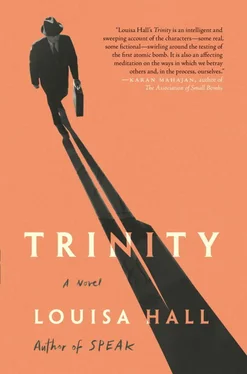Though I suspected this was the case, I had no real way of knowing if he’d chosen his western persona for no better reason than that it made him feel like an adult out of an American myth, like an adult who was never a child, but instead emerged fully formed from a god’s skull, carrying a quiver of Indian arrows.
FOR SOME TIME, USING MY USUAL TACTICS, I TRIED TO KNOW HIM.And when I found those tactics thwarted, I resorted to others.
During one of our meetings, for instance, I began to tell him stories from my own life in the attempt to make him comfortable with telling his own.
At first, I was clumsy in my approach. I had little practice in such self-revelations. Afterward, as a result, I often walked home through the park regretting the ways that I’d stumbled, by telling the anecdotes poorly, or misrepresenting the truth in an effort to make him feel that I understood or might understand him.
I told him, for instance, about a joke my father kept up throughout my childhood in Princeton. Because we all knew my mother hated the sound of knives being sharpened on flint, he always took care to sharpen the kitchen set near where she sat at the table. Grinning, goading her to a reaction, he’d swipe the blades closer and closer to the crescent of her cheek until he was so close we feared he’d slice her ear off.
When I told that story, in the back of that bar, I focused on my mother’s reaction. Staying true to her role in the joke, she never stood up. She never moved. Despite the fact that she knew her two daughters were watching, she stayed still as a statue, pretending to ignore him while he honed closer and closer.
But later, after I’d told the story, when I was walking home under the fringed canopies of the locusts, past the lights in people’s ground-level kitchens, I’d realize that, in focusing on my mother’s reaction, I’d neglected the expression on my father’s face, which always started exuberantly amused, and then began to shift, changing farther and farther away from itself the longer my mother remained at the table.
It was as though he, also, hated the joke. As though only her impenetrable stillness had forced him to continue, as though he was now the only active partner in the exchange. Grimly, forced to push the joke through to the punch line, he did so, but despised her the whole time for having coerced him to finish.
Instead of taking any pleasure in what had at first delighted him, he always finished that joke with a baffled expression. Just short of her ear, he’d simply stop and return to the kitchen, and maybe it was he who was more hurt and belittled than she was, bound in the position of finishing a joke he knew was a failure, a failure he might have been saved from if she’d simply stood up from the table and left him.
IF I TOLD SUCH STORIES IN AN ATTEMPT TO MAKE MY HUSBAND FEELmore at ease, and therefore more capable of making his own revelations, the strategy was a failure.
He only listened with that expression of deepening sympathy and attention that I recognized in Oppenheimer’s eyes when I sat down in his office.
And noticing the way that my husband—or the stranger he was then—was listening, I was sometimes overtaken with the realization that my childhood had in fact been quite sad.
That realization, hitting me by surprise, made me occasionally worry I might cry at that booth, in that bar that smelled like wet sawdust. And after completing such interviews with my husband, walking home through the park, I’d realize that, absorbed as I’d been in self-pity, I’d failed once again to find a doorway into my subject.
PERHAPS IT WAS THE FEELING OF EMBARRASSMENT AT MY SELF-ABSORPTION,or embarrassment at my ongoing failure, that caused me to give up my parrying efforts and finally allow my subject to kiss me.
From there, the involvement escalated rapidly. By the end of the month, I rarely went home to my own apartment. I spent most of my nights sleeping beside him in his, so that in almost no time at all, my discomfort with him had started to ebb, replaced with the thrill of practicing a new kind of knowledge.
Then, finally, I felt that I was coming to know him. Slowly, and without any sense that his story was taking any one final shape, I felt I was coming to an understanding of him that was far superior to the way I’d known my previous subjects: by attending to the facts of their lives, and organizing their plots in chronological sequence.
With my former subjects, I realized, I had been tyrannical. I had arranged their stories according to my own desire for a neatly developing plot.
With my husband, however, the process was different. I stood before him and allowed him to arrange me, and the glimpses of him that I received as a result were—or so I believed at the time—less forced, more authentic.
I allowed him, in other words, to remain a mystery. I allowed him to be incomprehensibly different from me. And in doing so, I felt I was coming to know him in the way you might know the center of a lake when you approach its farthest reaches at night: when you hear the sound of its edges lapping the shore but haven’t yet touched the skin of the water and don’t allow yourself to wade in yet.
In other words, I was careful. I didn’t intrude. I let him into me instead, and afterward, if I couldn’t sleep, I’d sometimes get out of bed and move through his apartment, observing his records, or the liquor he stored in the cabinet, or the rock collection he kept on a bookshelf.
I noted his fingerprints on the mirror in the bathroom, and the warped ring from his glass on a magazine he left accidentally open.
THIS NEW KIND OF KNOWLEDGE FASCINATED ME MORE THAN ANYother kind I’d acquired. During the day, when I was at work, or on the rare nights I spent in my own apartment, I began to experience the sensation of waiting to get back to the main project.
I lived my life, therefore, with a new feeling of anticipation, a feeling that built throughout the day, and became as distracting as something like hunger, so that when I walked into my husband’s apartment, I reached for him immediately.
From that point on, rather than listening to his somewhat ridiculous stories in that bar with the wet sawdust, I listened to him in the darkness of his bedroom after we’d slept together, while I was lying beside him, my body changed by the way that he’d touched me.
Outside, on the streets, the wails of sirens rose and fell, and red taillights passed their light over the back side of the curtains. People laughed on their way home from the bar. And inside, in the darkness, his fingertips ran the pearled length of my backbone, and my lips brushed his skin when I asked him my questions.
WE SEEMED TO BE DEPARTING THE CITY OUTSIDE. SOMETIMES, IN THEluxurious darkness of that apartment, set farther and farther away from the noises that filtered up from the street, I felt as if I’d followed him into the wood at the edge of the village.
Then I stopped asking questions. I simply followed, waiting to come to what he wanted to show me.
THEN THERE WAS LESS NEED FOR ACTUAL WORDS. SOMETIMES, INfact, when my husband spoke, I stopped listening to what he was saying. I only heard the rising and falling notes of his voice, or watched his mouth move, or touched his teeth with the tips of my fingers.
Or I’d close my eyes and wait for his hand on my back, a touch that was startlingly light when contrasted with the blunt personality he’d cultivated in public.
And it was that contrast, more than anything else, that allowed me to believe I’d finally stepped past the contrivance of his persona, and that in the privacy of the wood I’d followed him into, I was finally coming to know him.
Читать дальше












